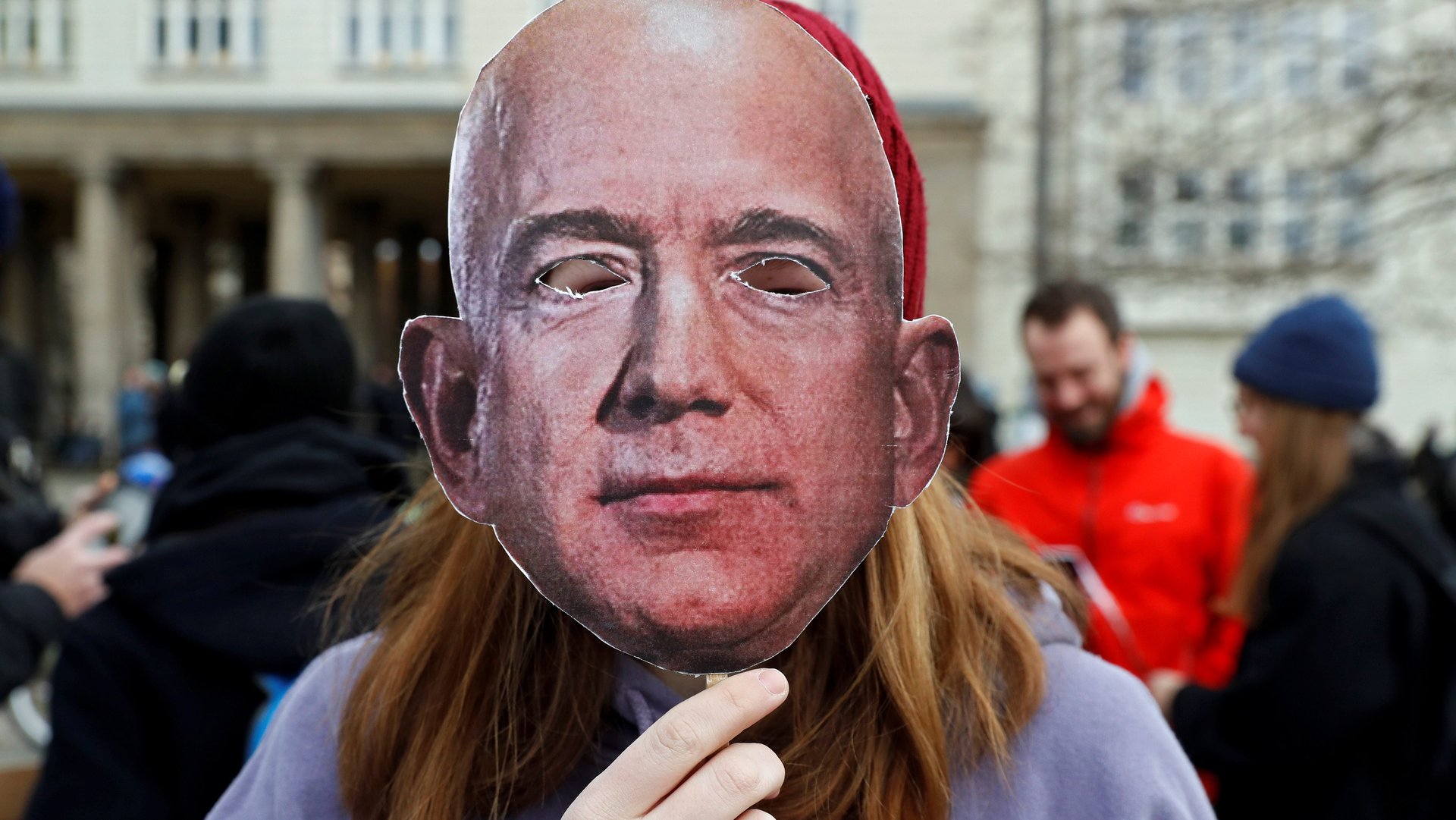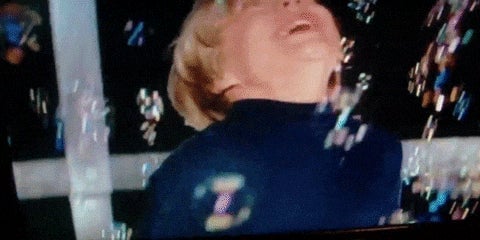Weekend edition—Jeff Bezos’s unfinished business, pandemic-style Super Bowl, emoji capitalism
Good morning, Quartz readers!


Good morning, Quartz readers!
“If you do it right, a few years after a surprising invention, the new thing has become normal,” Jeff Bezos told Amazon employees this week in a memo announcing the end of his reign as CEO. “People yawn,” he added. “That yawn is the greatest compliment an inventor can receive.”
If only Bezos had tried to induce yawns as an employer, too. He might have, for example, made it de rigueur for large companies to help employees in entry-level jobs work their way into a solid middle-class life, with strong wages and fair benefits. Talk about boring.
Bezos wouldn’t have received as much attention as he has by earning over $90 billion during a public health crisis of biblical proportions, one in which at least 20,000 of his employees were infected with Covid-19. He could have averted outrage over Amazon, currently valued at $1.7 trillion, stealing $61 million in tips from its Amazon Flex delivery people.
If he had accepted unionization drives at Amazon and its Whole Foods grocery chain, Bezos wouldn’t have seen his leadership team outed for attempting to run a smear campaign targeting an organizer. He could have avoided getting called out by the media—after raking in billions by serving customers who wanted to shop online in a pandemic—for trying to block mail-in voting during a potentially historic union election set to begin at a fulfillment center in Alabama next week.
Cracking the code that allows capitalism to work for everyone and not the few, on Amazon’s massive scale, would not have been yawn-worthy at first. Ensuring that, for example, none of the company’s hourly employees qualified for food stamp programs would have been huge news. Then, in time, it might have persuaded other businesses to adopt similar models, leading to new norms, and, finally, the high praise of a gaping yawn. —Lila MacLellan
Five things from Quartz we especially liked
Slower together? The EU had it all: a huge budget, world-class pharmaceutical companies, and government officials willing to use all of the above to secure early doses of the Covid-19 vaccine. It didn’t work out that way, as Quartz reporter Annabelle Timsit details. Delayed approvals, bureaucratic negotiating, and bad luck has turned the rollout into a moment that’s far from Europe’s finest. —Michael Coren, senior reporter
How we got to Robinhood. The chaos of last week’s GameStop fiasco was bound to happen one way or another. Finance reporter John Detrixhe takes a step back to explain Robinhood’s business origins, the allure of financial democratization, and how the company’s flirtation with ties to other financial institutions will likely be under the magnifying glass. —Katherine Ellen Foley, health and science reporter
That’s so metal. IPOs are anything but rare, except when it’s a stock named USA Rare Earth. The company is planning to go public and says a project in Texas has more than a century of supplies in the metals, which are a critical component in things like electric cars and weapons. As Mary Hui writes, Washington is hoping USA Rare Earth will help it break China’s monopoly over the metals. It’s an example of governments trying to unwind their supply chains, and how difficult it is to do so. —John Detrixhe, future of finance reporter
Discrimination in moderation. Lingerie company Adore Me accused TikTok of taking down content “that features plus-size, Black, and/or differently abled models and women of color” in underwear, while leaving up similar videos featuring white models. Marc Bain reports that this isn’t the first time the platform has been accused of moderating Black women’s bodies differently, although parent company ByteDance denies the allegation. —Nicolás Rivero, tech reporter
Dolly’s fumble. When the internet learned this week that country superstar Dolly Parton had remade her iconic song “9 to 5” as “5 to 9” for a Super Bowl ad about side hustles, it felt cheated. Sarah Todd’s fun and painfully true-to-life rewrite of the rewrite illustrates why. Some sample lyrics: “5 to 9, driving Lyfts and Ubers/ You might think that’s it/ But I also online tutor/ Want to take a break/ But my student debt won’t let me/ I swear sometimes the wealth gap’s out to get me!” —Lila MacLellan, senior reporter
One membership thing that made us 🏈
The Super Bowl, pandemic style. One of the globe’s biggest TV events of the year will be much changed. Here are some things you can expect to come into play:
😃 Fewer humans, more creepy cardboard cutouts. Masked fans should number about 25,000—fake fans will outnumber them at 30,000.
🎬 No surprise movie drops. And fewer film trailers in general.
🎤 A really weird halftime show. The Weeknd will be performing the annual spectacle in the stands.
🍺 Smaller brands being advertised. Bigger names are opting out this year, as the still exorbitant cost isn’t worth the risk.
The Super Bowl ad lineup may be the most public stadium for demonstrating that a one-size-fits-all advertisement just doesn’t cut it anymore. Check out our field guide on the future of the TV spot.
✦ Call this toll-free number to receive a seven-day trial of a Quartz membership absolutely free. Just kidding, use this link.
We’re obsessed with bubbles

When finance blows up. Every once in a while, a swath of the population goes mad for something—tech stocks, bitcoin, bicycles, a video game seller in Grapevine, Texas—propelling prices up and to the right until they can’t climb any higher. Sometimes these financial hurricanes pop relatively harmlessly, but other times they cause a deep economic crunch that rattles the economy. Are we headed for another market implosion? See what bubbles up with the Quartz Weekly Obsession.
Get the Weekly Obsession email sent to your inbox, for free!
Five things from elsewhere that made us smarter
We are what we’re advertised. What kinds of ads will flash up on Sunday during the Super Bowl? If this year is anything like past years, it’s going to be a lot of sex, comedy, danger, and patriotism. In an original analysis for FiveThirtyEight, Ryan Best watched 233 previous Super Bowl ads to get an idea of what brands think Americans are going to like. It’s a fascinating, if horrifying, black mirror. —Katherine Ellen Foley, health and science reporter
Why do so many Chinese liberals embrace Trumpism? On its surface, it may seem deeply incongruous for Chinese pro-democracy intellectuals, liberal academics, and human rights lawyers to be ardent Donald Trump supporters. But there are complex factors at play. For the Made in China Journal, Ling Li conducts a thoughtful and nuanced interview with US-based lawyer and activist Teng Biao. Together, they discuss the impact of confirmation bias, censorship, and trauma, and the appeal of social Darwinism. —Mary Hui, reporter
Quoque tu. It is hard to reconcile the wonders of classical literature with its role in perpetuating white supremacist myths. A common reaction is rejecting the criticism as anachronistic and an intent at voiding the discipline’s value. But Princeton scholar Dan-el Padilla Peralta, as profiled by Rachel Poser in the New York Times Magazine, is taking the opposite approach, actively acknowledging the way classical culture is in many ways foundational to a white-centered world-view and highlighting the elements that aren’t, so that they may secure the discipline a place in the future. —Annalisa Merelli, reporter
Lessons from an ice cream maker’s meltdown. Brooklyn-based Ample Hills seemed destined to be the next Ben & Jerry’s, with $19 million in funding, Disney licensing deals, and scores of customers dedicated to its inventive flavors like Ooey Gooey Butter Cake. As an Ample Hills fan myself, I was surprised to learn in Courtney Rubin’s profile in Marker that the creamery declared bankruptcy and was sold last year because the company’s founders proved that even an excellent product can’t hold up against classic startup mistakes. —Sarah Todd, senior reporter
💰 🚚 🙃. This fascinating NPR segment by Alexi Horowitz-Ghazi and Stacey Vanek Smith explores the “dark money” behind getting emojis to the market. A number of emojis are backed by big companies—interracial dating by Tinder or mosquitoes by the Bill & Melinda Gates Foundation, for instance. But when Ford subcontracted its emoji proposal to an ad agency costing north of $100,000, it raised the question of whether there needs to be a more transparent process. —Michelle Cheng, Quartz at Work reporter
Our best wishes for a relaxing but thought-filled weekend. Please send any news, comments, Dolly rewrites, and bubble tea to [email protected]. Get the most out of Quartz by downloading our app and becoming a member. Today’s Weekend Brief was brought to you by Lila MacLellan and Susan Howson